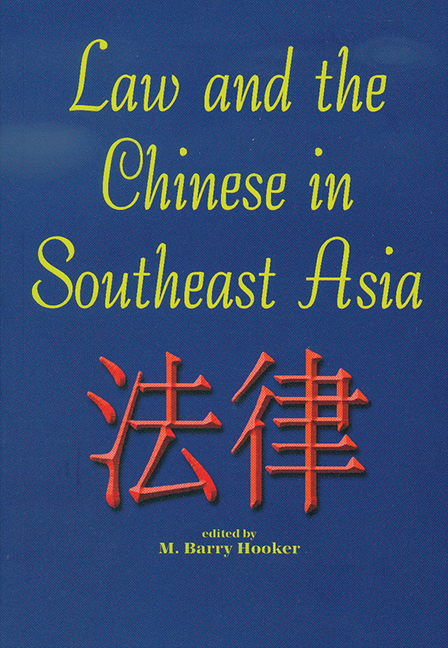Book contents
- Frontmatter
- Contents
- Preface
- The Contributors
- 1 Law and the Chinese Outside China: A Preliminary Survey of the Issues and the Literature
- 2 The Legal Position of the Ethnic Chinese in Indochina under French Rule
- 3 Law and Memory, De Jure to De Facto: Confucianization and its Implications for Family and Property in Vietnam
- 4 English Law and the Invention of Chinese Personal Law in Singapore and Malaysia
- 5 The Indonesian Chinese: “Foreign Orientals”, Netherlands Subjects, and Indonesian Citizens
- 6 Chinese Family Firms in Indonesia and the Question of “Confucian Corporatism”
- 7 China's Citizenship Law and the Chinese in Southeast Asia
- Index
1 - Law and the Chinese Outside China: A Preliminary Survey of the Issues and the Literature
Published online by Cambridge University Press: 21 October 2015
- Frontmatter
- Contents
- Preface
- The Contributors
- 1 Law and the Chinese Outside China: A Preliminary Survey of the Issues and the Literature
- 2 The Legal Position of the Ethnic Chinese in Indochina under French Rule
- 3 Law and Memory, De Jure to De Facto: Confucianization and its Implications for Family and Property in Vietnam
- 4 English Law and the Invention of Chinese Personal Law in Singapore and Malaysia
- 5 The Indonesian Chinese: “Foreign Orientals”, Netherlands Subjects, and Indonesian Citizens
- 6 Chinese Family Firms in Indonesia and the Question of “Confucian Corporatism”
- 7 China's Citizenship Law and the Chinese in Southeast Asia
- Index
Summary
INTRODUCTION
“Law and the Chinese outside China” was the subject of a conference held at the Australian National University on 1–4 July 1998. The focus was the laws relating to those of Chinese descent who live outside China, now often called the “diaspora Chinese”. We have avoided the term “Overseas Chinese” which implies residence (longer or shorter) outside China. It is misleading because the great majority of the 20 million or so diaspora Chinese are, in fact, long-term citizens of the Southeast Asian and Western Pacific states in which they are concentrated. They are not citizens of China, and it is not uncommon to find many families who have resided for hundreds of years in Southeast Asia, and are loyal to those states.
For this volume a number of revised papers have been selected for publication. The selection has been difficult because of the complexity of the subject. This introductory chapter will give a brief overview of the issues discussed in the following chapters. The study does not pretend to be exhaustive; as far as is known, law and the Chinese outside China has never before been approached as a single subject for extensive discussion.
The Geographical Area
In this volume we are concerned with that geographical area in which Chinese law, in one of its forms, has become a vital part of the legal heritage. Broadly speaking, there are two areas. The first consists of Japan, Korea and Annam (Vietnam). These are the modern states in which, historically, the Chinese legal legacy has played a determining intellectual role. Each state has taken elements of Ming and Qing legal thought and adapted them for its own use (see below).
The second comprises the states of what is now called Southeast Asia, where the vast majority of the diaspora Chinese now live and have lived for several hundreds of years. From west to east, the states are: Burma (Myanmar), Thailand, Laos, Cambodia, Vietnam, Philippines, Malaysia, Singapore, Brunei, and Indonesia.
The West and South Pacific (the United States and Canada, Australia and New Zealand, and the Pacific Islands) are excluded because at this stage this area probably replicates the trends already experienced in colonial and post-colonial Southeast Asia. The South and West Pacific Chinese legal diaspora may of course become a field for further study but for the time being, they are excluded here.
- Type
- Chapter
- Information
- Law and the Chinese in Southeast Asia , pp. 1 - 31Publisher: ISEAS–Yusof Ishak InstitutePrint publication year: 2002

